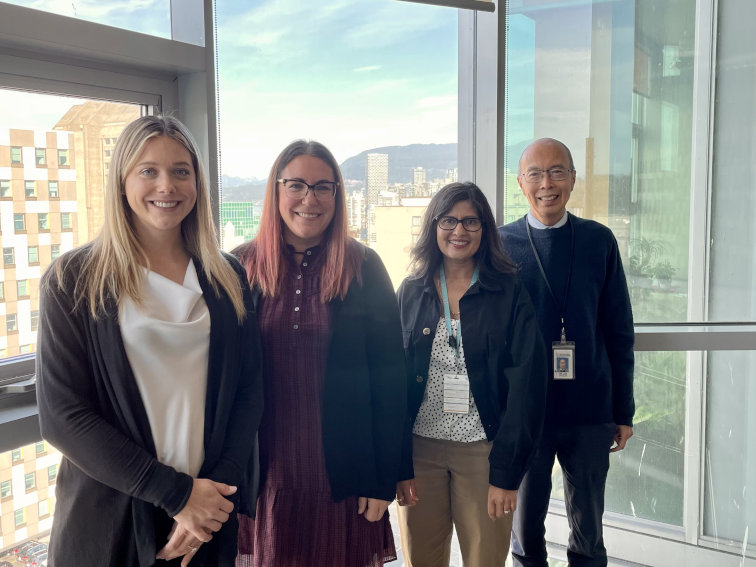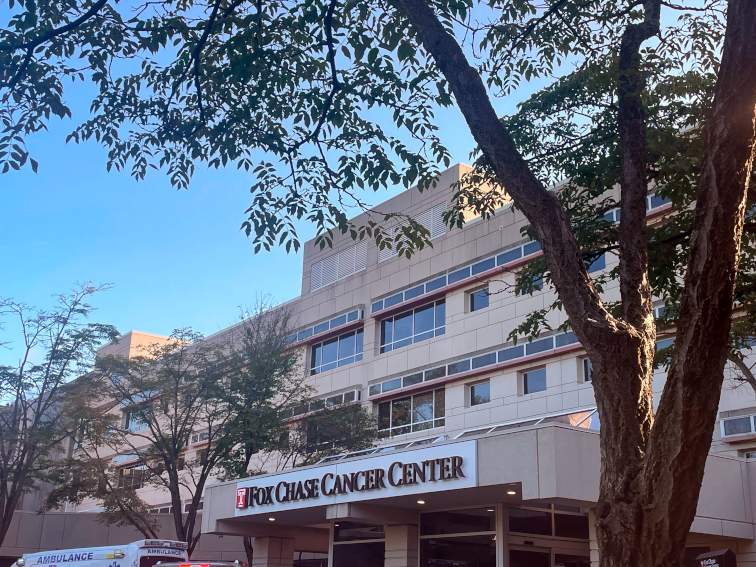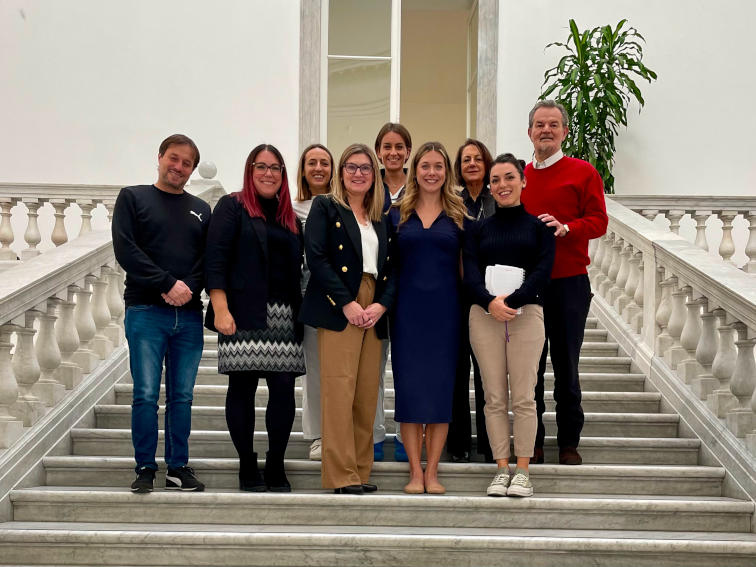Staff Highlight
The University of California San Diego, Moores Cancer Center – Dr. J. Silvio Gutkind

The nation’s largest non-government, non-profit funder of cancer researchers, the American Cancer Society (ACS), has awarded a CP-CTNet Principal Investigator (PI, UAZ21-07-01 (Metformin-Oral Cancer), J. Silvio Gutkind, PhD, the ACS Research Professor Award. This prestigious honor is awarded to investigators who have made ground-breaking contributions in cancer research. Please see the University of California San Diego (UCSD) website for a full writeup about Dr. Gutkin’s award. In addition, Dr. Gutkind provided an interview to the CP-CTNet Newsletter Team below.
Where did you go to school?
I graduated with a degree in Pharmacy and second degree in Biochemistry from the University of Buenos Aires, Argentina, and received my PhD in Pharmacology from the University of Buenos Aires, Argentina. I came to the United States as a post doc at the National Institutes of Health (NIH), and never left.
What drew your interest to pharmacology?
I grew up in a semi-rural area at the outskirts of Buenos Aires, Argentina, as the son of the town’s only pharmacist and full-time health professional. My father acted as a first line health provider and counselor, and helped triage patients, guiding them to seek immediate attention at the closest (often overcrowded) public hospital, or to visit any of the two physicians that had part time offices in our town. Growing up in this environment, I became acquainted with the highest ethical responsibility of those entrusted with making informed recommendations to patients. I also became acquainted with the limited options available at that time for the prevention and treatment of many highly prevalent, and often lethal human diseases. This sparked my early curiosity for understanding the processes and mechanisms underlying disease conditions, with perhaps the naïve expectation that if “we know it, we can fix it.” This drew my attention to pharmacology, the science of discovering how medicines work, and by doing so, how to translate our increasing mechanistic knowledge of pathological conditions into new interventions for a myriad of diseases. These days, I would argue that pharmacology is the discipline that can harness the full potential of the current precision medicine revolution.
How long have you been working with clinical trials?
Since ever! We are passionate about translating our novel findings into new treatment options, with emphasis on cancer. Working closely with my clinical colleagues, especially at the NCI and NIDCR, I have recently had the tremendous privilege to develop and contribute to several multi-institutional team efforts to translate our mechanistic discoveries into the clinic. These include the first use of mTOR inhibitors (mTORi) in newly diagnosed oral cancer patients (NCT01195922) and in an adjuvant trial after definitive treatment (NCT01111058), leading to highly encouraging responses in terms of clinical activity and acceptable toxicities. We also conducted the first trial using metformin, which targets mTOR in oral premalignancy, for oral cancer prevention (NCT02581137), and based on the positive results we have recently launched a Phase IIB trial (NCT05237960). As part of our new immune-oncology efforts, we recently found that preserving lymph nodes is central to the response to immunotherapies, as they are required for cancer antigen presentation by dendritic cells. This finding has been recently advanced to the clinic in a lymph node sparing neoadjuvant immune oncology trial (NCT04938609). As part of our studies on G proteins in cancer, we have used unbiased genetic screens to identify new treatment options for uveal melanoma. This provided the foundation for the first signal transduction-based multimodal precision therapy in metastatic uveal melanoma (NCT04720417). We look forward to continuing to deliver the benefits of our multi-disciplinary team’s discoveries to patients.
What are some of your research interests?
The goal of our research program is to exploit the emerging information on dysregulated signaling circuitries and individual genomic and molecular alterations to identify new therapeutic options to prevent and treat cancer. Our laboratory has focused on the study of growth-promoting signal transduction pathways, the nature of the dysregulated signaling networks in cancer, and on the use of genomic, proteomic, and system biology approaches to study tumor progression and immune escape, aimed at identifying new cancer therapies.
What is the focus of the Gutkind lab?
Specifically, we have shown that human and virally-encoded G proteins and G protein coupled receptors (GPCRs) can display potent oncogenic activity, and that many human malignancies harbor mutations in this receptor family and their linked G proteins. We have studied the tumorigenic activity of G proteins and GPCRs to dissect the signaling circuities regulating normal and aberrant cell proliferation, cancer progression, tumor-induced angiogenesis, and metastasis. We are now investigating 1) the mechanisms by which genetic mutations in Gαq proteins initiate uveal and cutaneous melanoma, with emphasis on the regulation of the Hippo pathway; 2) the role of Gαs and its target, PKA, in appendix, colon, and pancreatic cancer; and 3) how mutations, overexpression, and oncocrine activation of GPCRs contribute to tumor progression, immune evasion, and therapy resistance. In parallel, 4) we are exploring the role of the PI3K/mTOR signaling circuitry in cancers of the oral cavity, a disease that results in 300,000 deaths each year worldwide. Based on our prior studies, and emerging results from our recently completed multi-institutional clinical trial targeting mTOR in oral cancer, we are now investigating the effectiveness and mechanism of action of direct and indirect PI3K/mTOR inhibitors for oral cancer prevention and treatment, as single agents and as part of novel multimodal immunotherapy approaches. 5) Lastly, although GPCRs are the most druggable target in humans (>30% of all drugs in the market target GPCRs directly or indirectly for the treatment of a myriad of disease conditions), GPCRs have been mostly neglected in the current immune oncology revolution. We have recently discovered that multiple GPCRs can activate T cell exhaustion programs within the tumor microenvironment, thereby rendering immunotherapies ineffective. We are currently exploiting this information to increase the response to current immunotherapies, aiming to achieve durable responses (cure). 6) We also aim at training the next generation of biomedical scientists, who we expect will become the future leaders in academia, government, industry, and patient care.
What does it mean to you to be awarded the American Cancer Society Research Professor Award?
I am extremely honored to be named as American Cancer Society Research Professor! I am grateful to the American Cancer Society for this honor, recognizing our team’s efforts to prevent and treat cancer. I am also grateful for the continued support from the NCI and NIDCR and other research funding organizations over the year, and to our many collaborators and trainees with whom I have had the privilege to work with. The resources from the American Cancer Society will provide support for advanced mentoring initiatives aimed at making significant contributions to cancer treatment and research, while fostering diversity in the field. I am looking forward to continuing to deliver our discoveries to ALL patients and communities.
The University of Texas MD Anderson Cancer Center - Dr. Eduardo Vilar-Sanchez

What sparked your interest and how long have you been involved with clinical trials/research?
Trials are an amazing opportunity to advance the field and I realized it when I was a trainee in my initial years of residency in Medical Oncology in Vall d’Hebron University Hospital in Barcelona. I became involved in clinical trials since then and even conducted a Phase I clinical trial when I was a senior resident. I picked up my vocation for clinical trials as a Junior Faculty when I joined MD Anderson back in 2012. I conducted my first chemoprevention trial under the previous version of the CP-CTNet network and I enjoyed so much working with folks within our consortium and the opportunity to interact with the DCP and other investigators at other sites.
What is your role in the CP-CTNet Program?
I am the PI of iCAN-PREVENT: UT MD Anderson International Cancer Prevention Clinical Trial Consortium.
What challenges/advantages have you experienced within the CP-CTNet Program?
We came to the CP-CTNet with significant experience of participating in the Phase 0/I/II Cancer Prevention Clinical Trials Consortia Program. The Consortia mechanism and now the CP-CTNet offer a funding mechanism to support the Phase 0, I and II clinical trials focused on the development of new cancer preventive agents. We appreciate being a part of this national network of trials. It gives us the opportunity to conduct multi-center clinical trials through an established infrastructure. This program has its challenges, including sometimes cumbersome ways of activating clinical trials and the regulatory burden is high, but overall, the benefits of being a part of a network outweigh the challenges.
What advice do you have for other members of CP-CTNet who share your job title/responsibilities?
The CP-CTNet is led by very experienced PIs with a strong partnership from DCP that also has amazingly experienced people. I am the most junior of the LAO PIs, so rather than giving advice, I am here to watch and learn from my fellow PIs, accept their words of wisdom, and push the needle for our patients and families to bring the new wave of cancer interception approaches.
As an LAO in the CP-CTNet program, what practices can you share to help other LAOs be successful with their clinical trials?
We have found that when we conduct multi-center clinical trials, communication is key. Clear communication and clear directions can save all of us a lot of angst.
Who are your staff involved with CP-CTNet and what are their roles in the program?
I am the Principal Investigator of the network and I lead the program with support from our statistical collaborators, Dr. J. Jack Lee and Diane Liu. I am also supported by the LAO staff, which includes Ms. Lana Vornik for overall program operations, Ms. Tawana Castile and Ms. Theresa Nguyen for data management and monitoring, Mr. Chol Ho James Kim for regulatory operations, and Ms. Margie Aguilar for financial management.
Where did you go to college?
I attended University Miguel Hernandez Medical School in Alicante, Spain where I also received my Ph.D. I completed my Research and Clinical Fellowships at University of Michigan in Ann Arbor.
What are some of your hobbies/interests outside of work?
Tennis! My wife, three kids, and I enjoy doing drills, playing matches, and attending tennis tournaments as much as we can.
What is the best advice you’ve been given?
Enjoy what you do, and you will not have the feeling of working any single day of your life. I love this quote that was passed to me by one of my PhD advisors.
DMACC Updates
Data Management and Reporting Unit
Sue Siminski, MS, MBA (Unit Director, DMACC Sub-PI), Kayla Denson, PhD, MBA (Unit Co-Manager), Kelly Dunn, MPH, CCRP (Unit Co-Manager), Alex Krolikowski, MS (Training Specialist)
Announcements for LAOs
Whenever a Note to File (NTF) is issued for a study, please ensure that the DMACC Data Management team is included on the distribution email. It is important for the DMACC Data Management team to be aware of these NTFs, since they can affect how DMACC systems, such as Stars and Medidata Rave, are configured for the study and how routine data management is performed.
System Variable Attribute Report (SVAR) Process and Study Builds in Medidata Rave
Since the last newsletter update, DMACC started drafting the initial SVAR for study UMI23-13-01 (Omeprazole/Aspirin-Colorectal) and plans to finalize this initial SVAR to send to the LAO for review soon. DMACC is working with the LAOs to create SVARs for four studies, including INT22-09-01 (Apalutamide-Bladder), NWU22-12-01 (Urolithin A-Prostate), UMI22-09-01 (Acolbifene/Tamoxifen-Breast), and UMI22-09-02 (ONC201-Colorectal). DMACC is also working with the eCRF Review Team/DCP Study Team to review and approve SVARs for two studies, including UAZ22-10-01 (Calcipotriene-5-FU-Skin) and UWI20-04-01 (RG1-VLP). In the coming months, DMACC plans to start drafting initial SVARs for four studies, including INT23-14-01 (Tamoxifen-Breast), UAZ23-14-01 (LACTIN-V-Cervical), UMI23-14-02 (Tamoxifen/Omega-3-Breast), and UMI23-15-01 (Exercise Therapy). Since the last newsletter update, DMACC pushed two new study builds to production in Medidata Rave, including UMI21-05-01 (Obeticholic Acid-Barrett's Esophagus) and UAZ22-11-01 (BSSE-Firefighters).
Since the last newsletter update, DMACC also pushed ten study build migrations to production in Medidata Rave, including two for UWI20-00-01 (STEMVAC-Breast), UWI21-06-01 (GCC Agonists-Duodenum), UAZ20-01-02 (HPV Extended), UAZ21-07-01 (Metformin-Oral Cancer), NWU20-02-01 (Metformin/Megestrol-Endometrium), UAZ20-01-01 (Apalutamide-Prostate), NWU20-04-01 (Metformin-Lung), UAZ21-06-01 (BSSE-Lung), and NWU20-02-02 (Atorvastatin-Colon).
A data visualization of DMACC’s real-time, detailed CP-CTNet SVAR and Study Build Tracking report continues to be available to approved Portal Gateway users via the SVAR and Study Build Tracking dashboard item page on the CP-CTNet DMACC Portal Gateway.
Virtual Specimen Repository
The CP-CTNet Virtual Specimen Repository group met several times throughout this reporting period.
Laboratory Data Management System (LDMS) inventory data is transferring to DMACC in real-time for seven active studies, including INT21-05-01 (Tri-Ad5/N-803-Lynch Syndrome), NWU20-02-01 (Metformin/Megestrol-Endometrium), NWU20-02-02 (Atorvastatin-Colon), UAZ20-01-01 (Apalutamide-Prostate), UAZ21-06-01 (BSSE-Lung), UAZ21-07-01 (Metformin-Oral Cancer), and UWI21-06-01 (GCC Agonists-Duodenum). To date, DMACC has received approximately 3100 LDMS specimen records across these seven studies. In addition, DMACC is in the process of working with the LAOs to set up the following studies in the LDMS in anticipation of specimen collection soon: UAZ22-10-01 (Calcipotriene-5-FU-Skin), UAZ22-11-01 (BSSE-Firefighters), and MDA21-06-01 (Nous-209-Lynch Syndrome).
The Virtual Specimen Repository application is available on the Portal Gateway to a limited set of users. DMACC is continuously revising the application to support new sample types and is currently revising the application to incorporate pre-screened, screened, or screening failure participants as well as the related samples collected, with an anticipated updated release in December 2023.
Meetings
Eight Study Initiation Meetings (SIMs) were held for UAZ21-07-01 (Metformin-Oral Cancer), INT21-05-01 (Tri-Ad5/N-803-Lynch Syndrome), NWU20-02-02 (Atorvastatin-Colon), UAZ22-11-01 (BSSE-Firefighter), UAZ22-10-01 (Calcipotriene-5-FU-Skin), NWU22-12-01 (UroA-Prostate), and NWU20-02-01 (Metformin/Megestrol-Endometrium).
Four Cross-Network Collaboration (CNC) meetings were held with LAOs, DCP, and DMACC in June, August, October, and December. The next CNC meeting will be held in early 2024.
Since the last newsletter update, representatives from DCP and DMACC met with four LAO teams as part of DCP’s 2023 annual LAO site visits including the University of Wisconsin (UWI) on June 27th, University of Arizona (UAZ) on July 13th, University of Michigan (UMI) on August 22nd, and University of Texas MD Anderson (MDA) on September 19th.
The CP-CTNet Cross-Network Trials Working Group continued to meet monthly to update CP-CTNet REFGD06 CP-CTNet Cross-Network Trials Guidelines. This group aims to finalize this document during the fourth quarter of 2023.
The Data Safety Monitoring Board (DSMB) met for their annual meeting on October 6th, 2023, to discuss three cross-network trials including INT21-05-01 (Tri-Ad5/N-803-Lynch Syndrome), INT22-09-01 (Apalutamide-Bladder), and INT23-14-01 (Tamoxifen-Breast). The next DSMB meeting will be held in September 2024.
Documentation
DMACC worked with DCP to create, finalize, and post REFGD09 DCP Guidance Regarding Reporting Financial Conflict of Interest and REFGD13 CP-CTNet Responsibilities for Personnel Changes to the Program Resources page.
DMACC released the second CP-CTNet Manual of Standard Operating Procedures (M-SOP) in July (v2.0), which includes all SOPs that are used in CP-CTNet clinical trials in one PDF portfolio file. DMACC and DCP are working on updating several SOPs that will be included in the next version of the M-SOP (v3.0), which is slated for an early 2024 release. The M-SOP and related documentation are available on the Program Resources page.
DMACC created new quick reference guides on the topics of minimum data set reporting and Medidata Rave (QKREFGD14), clinical calculators and converters (QKREFGD15), grading CP-CTNet protocol deviations (QKREFGD17), and an Important CP-CTNet Dates for Accruing LAOs and AOs infographic. DMACC updated existing quick reference guides to reflect updated procedures and information on the topics of protocol deviation reporting (QKREFGD05) and review (QKREFGD06 and QKREFGD07), the CP-CTNet pre-screening form (QKREFGD12), and Medidata Rave reports (QKREFGD01). These quick reference guides are available on the Program Resources page.
Education
DCP and DMACC provided a webinar on adverse events to LAOs and AOs on July 11th, 2023.
DMACC offered 35 network-level training sessions to CP-CTNet members since the last newsletter update. Training session topics included the Medidata Rave AQuIP recruitment journal, the protocol deviation reporting and review process, grading protocol deviations, the Stars and Medidata Rave enrollment flow, the Audit System, Medidata Rave reports, determining treatment assignments in Stars, navigating the CP-CTNet DMACC public website and Portal Gateway, the Accrual Quality Improvement Program (AQuIP) enrollment trajectory, and the CP-CTNet M-SOP. To see a list of upcoming live trainings and to register, go to the Training Registration page on the CP-CTNet DMACC Portal Gateway.
DMACC is updating the CP-CTNet DMACC Portal Gateway to support the hosting of eLearning courses and is developing micro-eLearning courses to supplement the existing live training sessions and standalone resources.
New DMACC Staff: Kayla Liszewski, MPH

The DMACC team welcomes Kayla Liszewski to the DMACC Data Management and Reporting Unit! Kayla is a DMACC Data Manager and will be responsible for ensuring the production of timely, accurate, and unbiased clinical trial data from CP-CTNet studies by taking part in key data management support tasks, such as performing quality control of data, communicating with participating sites, and reviewing important trial documentation. She feels that her responsibilities are important as they focus on promoting and protecting the health and wellbeing of individuals when it comes to cancer prevention. Kayla earned her BA in Sociology from Hobart and William Smith Colleges in 2021 and earned her Master of Public Health (MPH), Epidemiology concentration, from the University at Buffalo in 2023. Prior to joining Frontier Science, Kayla was a Research Assistant for the Division of Behavioral Medicine, University at Buffalo Department of Pediatrics where she co-authored a research manuscript on smoking cessation methods among pregnant persons. This research manuscript was recently published in September 2023 in the JAMA Network. Welcome to CP-CTNet, Kayla!
CP-CTNet DMACC Public Website & Portal Gateway
Bob Starkweather, MS (Deputy Director of Software Engineering), David Goss, MA (Software Engineering Business Analyst)
DMACC continued to add and update resources, events, trials, and contact information on CP-CTNet-DMACC.org.
DMACC released CP-CTNet DMACC Portal Gateway v3.2.1, which included minor enhancements to improve network workflows during this reporting period. A new release of the CP-CTNet DMACC Portal Gateway (v4.0.0) is scheduled for mid-December, which adds support for uploading and presenting eLearning courses, as well as additional features for the DMACC User Support team, a new User Access Request log report, increased audit trail capabilities, and miscellaneous technical enhancements.
DMACC continued to add and update DMACC system support material and is exploring more data visualization options and reports that will be added to the CP-CTNet DMACC Portal Gateway to monitor study progress and key metrics.
CP-CTNet Memorandum Repository
DCP and DMACC are excited to introduce the new CP-CTNet Memorandum Repository! This memorandum repository is designed to effectively store, track, manage, and retrieve key memorandums (memos) circulated by CP-CTNet Leadership. This ensures that CP-CTNet memos are appropriately documented and accessible to all CP-CTNet members, which promotes consistent network communication and facilitates overall network efficiency. The memorandum repository will be released to the network in early 2024 on the CP-CTNet DMACC Portal Gateway and new memos will be added as they are finalized by DCP and DMACC.
Clinical Trials Auditing Unit
Julie Chang, MD (Unit Director), Holly Shaw, MS, CCRP (Unit Co-Manager), Barbara Wollmer, BSN, RN (Unit Co-Manager), Meredith Kissel, MPH (Clinical Trials Auditor)
During 2023, the Audit team conducted annual LAO audits for UAZ, UWI, MDA, and NWU, as well as AO audits for Roswell Park (two studies), Johns Hopkins University (two studies), University of Puerto Rico, Fox Chase Cancer Center, Thomas Jefferson University, British Columbia Cancer Research Centre, and Galliera Hospital, Italy. In 2024, the Audit team plans to perform audits at the University of Kansas, Johns Hopkins, and UMI for their first annual LAO audit. More audits will be added to the 2024 schedule as studies continue to open and as accruing LAOs and AOs enroll participants. All LAOs and AOs will be given at least six weeks’ notice of DMACC’s intent to audit.
The Audit team is working with DCP to update the network’s auditing algorithm to align with the appropriate risk level and industry standards. Once finalized, the updated algorithm will be incorporated into SOP 03-02 Site Preparations for Quality Assurance Audits.
The Audit team continued to work on improvements and updates to the Audit System during this reporting period. A new release of the Audit System is scheduled for December, which includes support for comment/note entry with no size limits, autosaving, reduced page refreshes, page location saving upon refresh, new audit form questions, as well as miscellaneous user interface updates.



Administrative and Coordinating Unit
KyungMann Kim, PhD (Unit Director, DMACC Principal Investigator), Kelly Miller, BS, CCRC (Unit Manager), Bridget Dermody, BS (Administrative Specialist)
The DMACC Administrative Unit continues to hold weekly, biweekly, and monthly meetings to continue efficiency and improvements within CP-CTNet.
The I-SCORE 2024 Planning Committee began brainstorming for the March 14th – 15th, 2024 meeting which will be held in Rockville, MD as well as virtually. Their kickoff meeting was on November 14th, 2023 and plans to meet every two weeks for the next few months and will meet more frequently as the meeting date approaches. The agenda is being formed and potential speakers are being identified. The planning team members are Dr. Howard Parnes (NCI), Dr. Seema Khan (NWU), Ellen Richmond (NCI), Mela Asefa (NCI), Perquita Perry (NCI), Rodshae Garvey (NCI), Kelly Benante (NWU), Loretta Jurnak (TRI), Shawn Pearson (TRI), Amy Lippincott (TRI), Kelly Miller (UW-Madison DMACC), Bridget Dermody (UW-Madison DMACC), and Avery Whitbeck (UW-Madison DMACC). Be on the lookout for email communication regarding meeting registration and hotel accommodations. If you have questions or comments, please contact us at Admin_CP-CTNet@frontierscience.org.
Research Funding Opportunities
Grants & Awards
The Cancer Prevention and Control Clinical Trials Grant Program (R01 Clinical Trials Required) was published on Friday, December 15th, 2023.
For a full list of funding opportunities, check the Funding Opportunities page.
Active and DCP-Approved Studies
A list of active and DCP-approved studies is available on the Trials page. Each trial includes the title, status, DCP ID, and a link to a trial-specific information page once trial information is available on clinicaltrials.gov.
Upcoming Events
Meetings and events can be found on the Meetings and Events page.